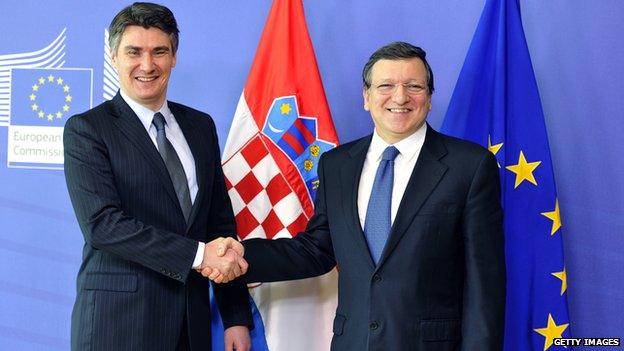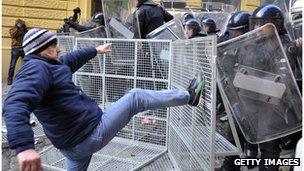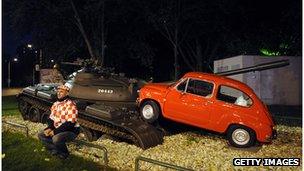Croatia's on-off love affair with the EU
- Published

They got there in the end: Croatia's Prime Minister Zoran Milanovic, left, with president of the European Commission Jose Manuel Barroso
Some 20 years ago, as Croats broke away from the former Yugoslavia in bloody fashion, it is estimated that perhaps three-quarters of all Croats yearned to join the European Union, or European Community as it then was.
Today, in the run-up to Croatia's admission to the EU in July, the number of those who approve of the move is just 45%. Boris Pavelic, a reporter with the Balkan Insight website, asks why.
Go into the streets of the capital Zagreb, ask about joining the EU and you will get a range of views.
"Croatia's legal system would become better, more efficient and hopefully more credible," says pensioner Veljko Jovanovic.
Zagreb academic, Borka Lugaric, echoes this view on the EU "fixing" the legal system and eradicating Croatia's "omnipresent corruption".
But he is generally against his country joining the EU, as it would "burden Croatia with a lot of financial obligations".
Worries about the economy are shared by Antonija Letinic, a cultural manager, who hopes that "some kind of economic prosperity could emerge from Croatia's EU membership", but fears that the EU's own economic problems could undermine that.
Fear of expansion
Other reasons cited by those in favour are the freedom to study or travel abroad, or to find a job more easily.
These sentiments reflect the general idea that EU membership could both broaden opportunities for Croats in Europe and that Brussels will keep their government institutions on the straight and narrow.
Those against membership worry more about the cost of living. They fret that prices will rocket and that other EU citizens will arrive in numbers and occupy well-paid jobs. While it is unlikely thousands will make a bee line for Croatia, the country will face challenges from the moment it becomes a member.

Anger over high unemployment has spilled over into confrontation on the streets of Zagreb
Sandra Svaljek, an analyst with the Zagreb-based Economy Institute, predicts "creative destruction" in the private sector once Croatia joins the EU.
Croatia, she says, already has a "hard time" competing in the EU market. It exports little in any case, and for many exports its natural market is not even in the EU.
"Generally, EU competition is too strong for the Croatian economy," Ms Svaljek says.
Furthermore, Croatia's economy is already on its knees.
Around 120,000 people have lost their jobs in the last five years, with unemployment rising from 14 to 20%. Whole sectors like construction have collapsed.
Meanwhile, Croatia's credit rating has been cut twice in recent months. Foreign investors are turning their back on the country. According to official data, foreign direct investment has fallen 80% since 2008 and last year was back to 1999 levels.
Since 2008 the country's GDP has fallen 11% and keeps falling, "with no light at the end of the tunnel", according to economics journalist Ivo Jakovljevic.
When Croatia struck out on its own as the former Yugoslavia fell apart, any talk of joining the EU seemed a little contradictory, especially to those nationalists who drove the separation from the former communist federation.
Yes, the EC, together with the UN, had helped extinguish the war in Croatia. But why, after struggling to become fully independent for the very first time, would Croatia want to join a "Euroslavia"?
In the post-war years the issue of joining the European bloc did not arise. Croatia was internationally isolated by then, pressured by the EU and others to give up those of its citizens who were accused of war crimes.
Unknowns
When a raft of other former eastern bloc nations, including the former Yugoslav republic of Slovenia, joined the EU in 2004 Croatia was only just beginning its own accession talks.
Seeing Slovenia, its near neighbour, block Croatia's accession talks over a border dispute depressed support for joining the EU to just 29% in opinion polls. It has risen since to 45%, but those against or undecided are in the clear majority.
Croatia's Foreign Minister, Vesna Pusic, is confident that the true numbers are those reflected in the outcome of the country referendum on joining. Held in January 2012, a full 66% of those who voted were in favour.

A museum display depicting a scene from Croatia's war of independence
The key to understanding this, she says, is the stability that membership offers. After a conflict that killed 10,000 of its citizens, Croatia has been left with its own scars, as well as atoning for the wounds it inflicted on others in region.
"Durable political stability is a key objective for Croatia, since in the last hundred years every state in the Balkans has lasted no longer than an average human life," she says.
Yet there remains widespread suspicion and ignorance about the EU.
In March a man who erected an EU flag on his newly-built house was quizzed by neighbours as to "which Muslim country" the flag belonged to. A local newspaper even investigated whether it was legal to raise the EU's ring of stars. It discovered that it was.
But if some Croats are not very knowledgeable about the EU, officials in Zagreb worry that the EU is not too clued-up on Croatia.
The country's national football team, which has been among the 10 best in the world, is well known among sports fans. But few are familiar with Croatia's rich cultural, historical and arts heritage.
To correct this, Croatia's ministry of culture is busy promoting the country in key EU capitals in a series of festivals. Paris hosted one last year. Germany has done so this year.
Currently, it is London's turn. Highlights include lectures on Croatia's place in history, contemporary Croatian drama and how to set up a business in Croatia.
It is all an attempt to overcome the association of Croatia with either sun and blue sea or, less sympathetically, nationalism and bigotry.